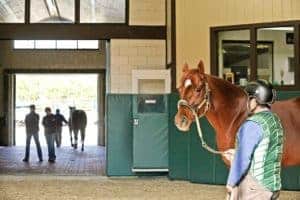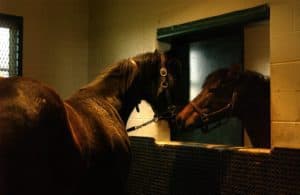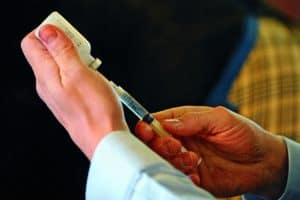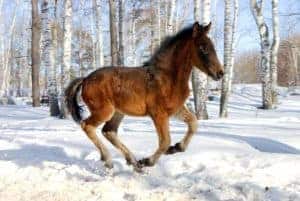
Humane Housing Options for Stallions
Discover a better way to manage stallions to help meet their social needs and improve welfare.

Discover a better way to manage stallions to help meet their social needs and improve welfare.

Most stallions should be fed according to their maintenance requirements, depending on if and how much they’re exercising, when not being bred or collected.

Both the stallion and mare must be in good health and fertility before you even attempt to produce a foal.

Results from a recent study in Egypt showed an association between certain horse demographics and vulnerability to West Nile virus.

Many factors influence stallion fertility, a good number of which can be managed and improved.

Dr. Camie Heleski of the University of Kentucky talks about research into cohousing for stallions.

Vegetable- and marine-based sources can provide your horse with essential omega-3 fatty acids. Here are some things to consider when choosing an omega-3 supplement for your horse.

Get your questions answered about breeding mares and stallions and producing top-quality, healthy foals during our live Q&A. We cover everything from selecting the right parents to gestational care to ensuring your foal’s safe delivery.

Learn about 14 factors that can affect your stallion’s fertility.

My stallion shows little or no signs of libido with my mare. He won’t even talk to her. What can I do?

A mare’s attraction to a stallion—specifically, to his body odors, or “MHC”—affects pregnancy success rates. And, researchers found, mares appear to prefer stallions with MHCs that differ from their own.

Two doses of an “anti-GnRH” vaccine led to full, but reversible, sterility in a group of French study stallions, researchers found.

This can pose a problem for mare owners working with a limited breeding window due to the short lifespan of the mare’s oocyte and the stallion’s sperm.
Lecture topics will include parasitology, gastric ulcers, fescue management, respiratory conditions, and more.

Blood samples revealed a 21% positive rate in breeding stallions compared to 6.7% in sport horses.

Presenters will cover topics including safety, horse welfare, equine reproduction, horse management, and more.
Stay on top of the most recent Horse Health news with
© 2022 Copyright Statement dolor sit amet, consetetur sadipscing User Terms, sed diam nonumy eirmod tempor invidunt ut labore et dolore magna aliquyam erat, sed diam voluptua. At vero eos et accusam et justo duo dolores et ea rebum. Stet clita kasd gubergren, no sea takimata sanctus est Lorem ipsum dolor sit amet.
"*" indicates required fields